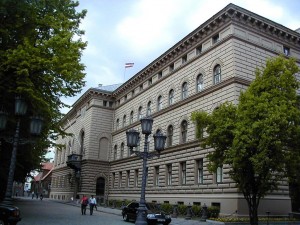
At his speech at the Saeima yesterday Latvian Prime Minister Valdis Dombrovskis said the government would try to limit its budget deficit to 10 percent instead of the 13 percent it negotiated with the IMF in August. Photo by J. Sedols.
RIGA — At the Saeima yesterday Latvian Prime Minister Valdis Dombrovskis rolled out his government’s plan to turn around the country’s economy, one of the hardest hit by the crisis in the world.
In his speech to the parliament Dombrovskis said that the maximum permissible budget deficit this year is 10 percent of gross domestic product and 8.5 percent next year. The government’s main goal is budget stabilization because even during the boom years, the budget wasn’t balanced.
The budget deficit cap goal is less than the 13 percent cap the government negotiated with the International Monetary Fund as a condition of disbursing a €195 million loan tranche on Aug. 27.
A series of austerity measures, including value-added tax increases and cuts throughout the ministries have been implemented to keep down Latvia’s deficit. But despite the slashing of social welfare programs under his government, Dombrovskis said yesterday that the government will do more to support the social security network.
“We have to realize what awaits us in the fall and in winter, and what the unemployment will be like. The government’s social security network development will focus on welfare, education and healthcare,” Dombrovskis told the Saeima yesterday.
Some even within the prime minister’s own coalition are questioning how the meager government coffers will pay for this. The People’s Party Saeima group’s head Vineta Muižniece said during the debate that raising taxes would not produce the desired effect. She said the opposite would occur with higher taxes will having a negative effect on the national economy and residents’ welfare.
“Taking far-reaching steps in reducing budget spending, changing the taxation system and public administration requires significant support from the community and the social partners,” Muižniece said.
Microcredit to stimulate economy
In a similar move to southerly neighbor Lithuania’s economic stimulus plan, part of the Latvian government plan to set the economy right is to distribute European Union funds to small businesses through its risk capital scheme. Between 600 to 700 million lats (€857 million to 1 billion) has been allocated to be distributed to businesses for the purposes of supporting entrepreneurship.
In October an agreement will be signed with administrative company BaltCap Management Latvia to distribute funds to small and medium-size businesses (SMEs). It will give SMEs access to up to 21.3 million lats (€30 million) from the the risk capital fund.
A special seed and commencement capital fund will start its activities with the total financing of €21.4 million aimed at giving SMEs the ability to develop new products and continue marketing. Also a high-risk loan program is being introduced with total financing of €104 million.
— Baltic Reports editor Nathan Greenhalgh contributed to this article.













Interesting is this BaltCap Management Latvia. Time will tell whether there are going to be over priced managers and several rich politicians handling the business behind the curtains. I wish, I’m completely wrong, and this would bring out something new and good.